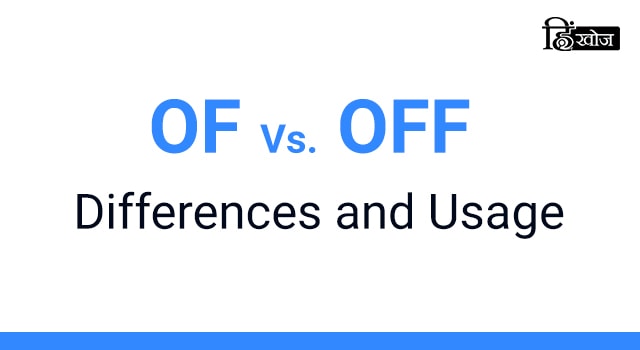The English language is filled with Homophones and the pair 'OF and OFF' is a classic example.
But first, let's understand 'What are Homophones?'
When two (or more than two) words have the same pronunciation but different meanings, origins, or spelling, we call them HOMOPHONES.
जब किन्ही दो या दो से ज़्यादा शब्दों का उच्चारण एक सामान हो परन्तु उनके अर्थ या spelling अलग अलग हों तो उन्हें HOMOPHONES कहा जाता है।
To learn more about homophones, click to read 'Homophones और Homographs की मिलती-जुलती दुनिया'
Today we'll understand the difference between OF and OFF.
I know, both sound similar and you must be thinking that why does it matter if we add or remove one 'f'?
Well, it makes a big difference and if you think that similar sounding words have same meanings, please read the above-mentioned blog and the myth will be broken.
Coming back to the topic, let's learn the differences and uses of today's homophone pair.
 OF
यह एक prepositional word (पूर्वसर्ग) है जो की दो अलग अलग शब्दों या वाक्यांशों के बीच सम्बन्ध बताता है।
OF का प्रयोग possession यानि अधिकार व स्वामित्व दर्शाने के लिए भी किया जाता है।
यदि आपको किसी चीज़ का निर्धारित स्थान, समय या origin बताना है, तब भी आप OF का प्रयोग कर सकते हैं।
Let's understand with some examples:
To show relation between two things
• Ajay is a good friend of Rahul's.
• अजय राहुल का अच्छा दोस्त है।
To show possession or belongingness
• The Queen of England is an elegant lady.
इंग्लैंड की रानी एक सभ्य औरत है।
• He burnt a piece of wood to ignite the fire.
उसने अग्नि प्रज्वलित करने के लिए लकड़ी का एक टुकड़ा जलाया।
To show position in space and time
• Put the plant in the south of the desk.
पौधे को डेस्क के दक्षिण में रखो।
• At the time of my marriage, I was only 20 years old.
अपनी शादी के समय, मैं केवल 20 साल का था।
OFF
OFF का प्रोयोग preposition या adverb दोनों तरह से किया जा सकता है।
You can use this word in various situations but the underlying meaning remains the same that is some sort of separation, disconnect, absence, etc.
आइये देखते हैं OFF के uses:
To describe something that is far away from a particular place
• Sam ran off from the country.
• Sam देश से बाहर भाग गया।
To show a state of discontinuity or suspension
• I took a week off from the office.
• मैंने कार्यालय से एक सप्ताह की छुट्टी ली है।
As an opposite word for 'on'
• Why did you turn the fan off? I just switched in on a minute ago?
• तुमने पंखा बंद क्यों कर दिया? मैंने अभी एक मिनट पहले ही चलाया था।
When something has been removed from somewhere
• The phone screen got the scratches because you took off the cover.
• Phone की screen पर इसलिए खरोंचें पड़ गए क्योंकि तुमने cover हटा/उतार दिया।
So, that's pretty much about the usage of the words OF and OFF.
I guess you all are now very well aware of the difference between these two words.
To learn more, keep reading the blogs and download our app Namaste English.
OF
यह एक prepositional word (पूर्वसर्ग) है जो की दो अलग अलग शब्दों या वाक्यांशों के बीच सम्बन्ध बताता है।
OF का प्रयोग possession यानि अधिकार व स्वामित्व दर्शाने के लिए भी किया जाता है।
यदि आपको किसी चीज़ का निर्धारित स्थान, समय या origin बताना है, तब भी आप OF का प्रयोग कर सकते हैं।
Let's understand with some examples:
To show relation between two things
• Ajay is a good friend of Rahul's.
• अजय राहुल का अच्छा दोस्त है।
To show possession or belongingness
• The Queen of England is an elegant lady.
इंग्लैंड की रानी एक सभ्य औरत है।
• He burnt a piece of wood to ignite the fire.
उसने अग्नि प्रज्वलित करने के लिए लकड़ी का एक टुकड़ा जलाया।
To show position in space and time
• Put the plant in the south of the desk.
पौधे को डेस्क के दक्षिण में रखो।
• At the time of my marriage, I was only 20 years old.
अपनी शादी के समय, मैं केवल 20 साल का था।
OFF
OFF का प्रोयोग preposition या adverb दोनों तरह से किया जा सकता है।
You can use this word in various situations but the underlying meaning remains the same that is some sort of separation, disconnect, absence, etc.
आइये देखते हैं OFF के uses:
To describe something that is far away from a particular place
• Sam ran off from the country.
• Sam देश से बाहर भाग गया।
To show a state of discontinuity or suspension
• I took a week off from the office.
• मैंने कार्यालय से एक सप्ताह की छुट्टी ली है।
As an opposite word for 'on'
• Why did you turn the fan off? I just switched in on a minute ago?
• तुमने पंखा बंद क्यों कर दिया? मैंने अभी एक मिनट पहले ही चलाया था।
When something has been removed from somewhere
• The phone screen got the scratches because you took off the cover.
• Phone की screen पर इसलिए खरोंचें पड़ गए क्योंकि तुमने cover हटा/उतार दिया।
So, that's pretty much about the usage of the words OF and OFF.
I guess you all are now very well aware of the difference between these two words.
To learn more, keep reading the blogs and download our app Namaste English.
Blog Post



